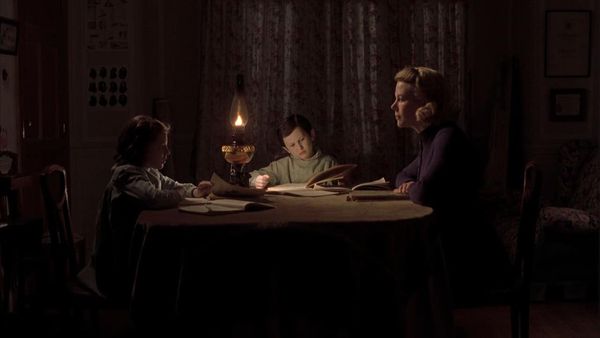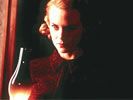Eye For Film >> Movies >> The Others (2001) Film Review
The Others
Reviewed by: Angus Wolfe Murray

Children have a sixth sense. They lose it when they grow up, as they cast off all that is deemed childish. Before logic clips the wings of imagination, fear has a reality you can touch. Darkness should protect the innocent, but it doesn't, because darkness is never empty.
It is the children in The Others who understand. They don't say it out loud, especially not to Mummy. They don't say it to themselves, either, because it's frightening. Anne (Alakina Mann) talks to her younger brother Nicholas (James Bentley) about "when Mummy went mad." He doesn't want to remember. She teases him. "What happened? What happened?" Nicholas scrunches up his face, as if about to cry, and Anne laughs. Having power over him is fun.

This is a film about denial. It is also a film about what Mrs Mills (Fionnula Flanagan) says: "Sometimes the world of the dead and the world of the living get mixed up together." The house on Jersey stands in its own grounds, isolated and forbidding. It is 1945. The war has just ended. Grace (Nicole Kidman) waits news of her husband (Christopher Eccleston), who has been fighting in France.
She keeps the children in curtained rooms, believing that sunlight will make them ill. She locks every door, when entering and leaving, no matter where she is. She loves her children and takes care of their education herself, especially religious studies. They don't go out. They don't meet anyone. Except Victor. Anne sees Victor. Grace refuses to believe it. She hears noises in empty rooms. The pressure of retaining standards, with servants who never stay long, is not easy. She has to be firm. But why do the servants leave?
Mrs Mills, the gardener Tuttle (Eric Sykes) and a mute girl (Elaine Cassidy) arrive at the door, looking for employment, just at the right moment. They seem to know the house and settle in quickly. Grace is difficult to work for. She is nervous, contrary and short-tempered. Mrs Mills, by comparison, is respectful, diligent and warm-hearted. She tells Anne that she knows about Victor. "They are here," she says, meaning the others.
Ghost stories are notoriously difficult to film and now, with the advent of computer-generated special effects, even harder. If anyone sat through Jan De Bont's version of The Haunting, with Liam Neeson, they will understand how effects can mess things up. The less you see, the more you believe. Chilean born writer/director Alejandro Amenabar, who is still in his twenties, knows this. He succeeds beautifully in creating an atmosphere of unease. Nothing is quite right in the house, not only because Grace's responses can be extreme at times, but because of this inexplicable relationship between the living and the dead.
The performances are flawless. The children, who are not trained actors, are utterly believable. Flanagan's Irish charm goes a long way to disguise the true nature of Mrs Mills's character and Kidman, yet again, proves her versatility. Grace is complex and controlled, a difficult combination to express without appearing unsympathetic. At times she feels as taut as a bow string.
Amenabar slowly unravels the thread that will explain the mystery. He does not want to frighten the living daylights out of you. He's like the children. He has a sixth sense.
Reviewed on: 01 Nov 2001

















